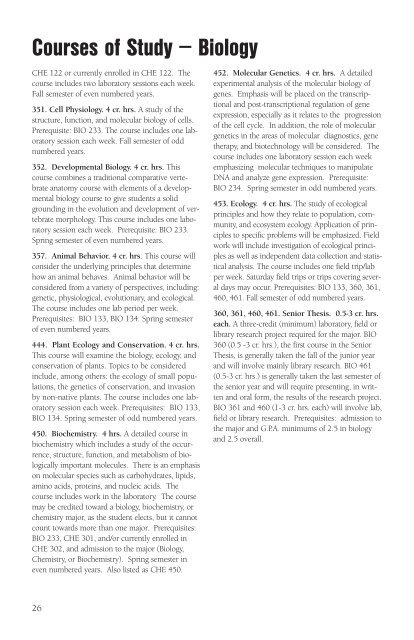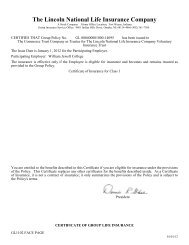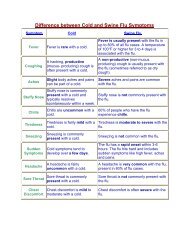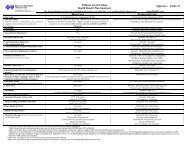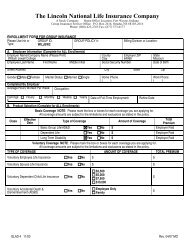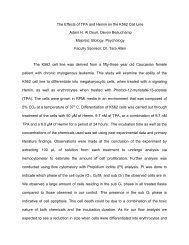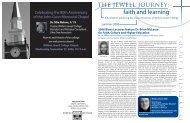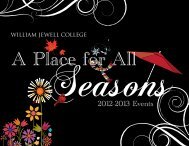Courses of Study - William Jewell College
Courses of Study - William Jewell College
Courses of Study - William Jewell College
Create successful ePaper yourself
Turn your PDF publications into a flip-book with our unique Google optimized e-Paper software.
<strong>Courses</strong> <strong>of</strong> <strong>Study</strong> – Biology<br />
CHE 122 or currently enrolled in CHE 122. The<br />
course includes two laboratory sessions each week.<br />
Fall semester <strong>of</strong> even numbered years.<br />
351. Cell Physiology. 4 cr. hrs. A study <strong>of</strong> the<br />
structure, function, and molecular biology <strong>of</strong> cells.<br />
Prerequisite: BIO 233. The course includes one laboratory<br />
session each week. Fall semester <strong>of</strong> odd<br />
numbered years.<br />
352. Developmental Biology. 4 cr. hrs. This<br />
course combines a traditional comparative vertebrate<br />
anatomy course with elements <strong>of</strong> a developmental<br />
biology course to give students a solid<br />
grounding in the evolution and development <strong>of</strong> vertebrate<br />
morphology. This course includes one laboratory<br />
session each week. Prerequisite: BIO 233.<br />
Spring semester <strong>of</strong> even numbered years.<br />
357. Animal Behavior. 4 cr. hrs. This course will<br />
consider the underlying principles that determine<br />
how an animal behaves. Animal behavior will be<br />
considered from a variety <strong>of</strong> perspectives, including:<br />
genetic, physiological, evolutionary, and ecological.<br />
The course includes one lab period per week.<br />
Prerequisites: BIO 133, BIO 134. Spring semester<br />
<strong>of</strong> even numbered years.<br />
444. Plant Ecology and Conservation. 4 cr. hrs.<br />
This course will examine the biology, ecology, and<br />
conservation <strong>of</strong> plants. Topics to be considered<br />
include, among others: the ecology <strong>of</strong> small populations,<br />
the genetics <strong>of</strong> conservation, and invasion<br />
by non-native plants. The course includes one laboratory<br />
session each week. Prerequisites: BIO 133,<br />
BIO 134. Spring semester <strong>of</strong> odd numbered years.<br />
450. Biochemistry. 4 hrs. A detailed course in<br />
biochemistry which includes a study <strong>of</strong> the occurrence,<br />
structure, function, and metabolism <strong>of</strong> biologically<br />
important molecules. There is an emphasis<br />
on molecular species such as carbohydrates, lipids,<br />
amino acids, proteins, and nucleic acids. The<br />
course includes work in the laboratory. The course<br />
may be credited toward a biology, biochemistry, or<br />
chemistry major, as the student elects, but it cannot<br />
count towards more than one major. Prerequisites:<br />
BIO 233, CHE 301, and/or currently enrolled in<br />
CHE 302, and admission to the major (Biology,<br />
Chemistry, or Biochemistry). Spring semester in<br />
even numbered years. Also listed as CHE 450.<br />
452. Molecular Genetics. 4 cr. hrs. A detailed<br />
experimental analysis <strong>of</strong> the molecular biology <strong>of</strong><br />
genes. Emphasis will be placed on the transcriptional<br />
and post-transcriptional regulation <strong>of</strong> gene<br />
expression, especially as it relates to the progression<br />
<strong>of</strong> the cell cycle. In addition, the role <strong>of</strong> molecular<br />
genetics in the areas <strong>of</strong> molecular diagnostics, gene<br />
therapy, and biotechnology will be considered. The<br />
course includes one laboratory session each week<br />
emphasizing molecular techniques to manipulate<br />
DNA and analyze gene expression. Prerequisite:<br />
BIO 234. Spring semester in odd numbered years.<br />
453. Ecology. 4 cr. hrs. The study <strong>of</strong> ecological<br />
principles and how they relate to population, community,<br />
and ecosystem ecology. Application <strong>of</strong> principles<br />
to specific problems will be emphasized. Field<br />
work will include investigation <strong>of</strong> ecological principles<br />
as well as independent data collection and statistical<br />
analysis. The course includes one field trip/lab<br />
per week. Saturday field trips or trips covering several<br />
days may occur. Prerequisites: BIO 133, 360, 361,<br />
460, 461. Fall semester <strong>of</strong> odd numbered years.<br />
360, 361, 460, 461. Senior Thesis. 0.5-3 cr. hrs.<br />
each. A three-credit (minimum) laboratory, field or<br />
library research project required for the major. BIO<br />
360 (0.5 -3 cr. hrs.), the first course in the Senior<br />
Thesis, is generally taken the fall <strong>of</strong> the junior year<br />
and will involve mainly library research. BIO 461<br />
(0.5-3 cr. hrs.) is generally taken the last semester <strong>of</strong><br />
the senior year and will require presenting, in written<br />
and oral form, the results <strong>of</strong> the research project.<br />
BIO 361 and 460 (1-3 cr. hrs. each) will involve lab,<br />
field or library research. Prerequisites: admission to<br />
the major and G.P.A. minimums <strong>of</strong> 2.5 in biology<br />
and 2.5 overall.<br />
26


